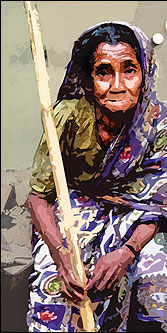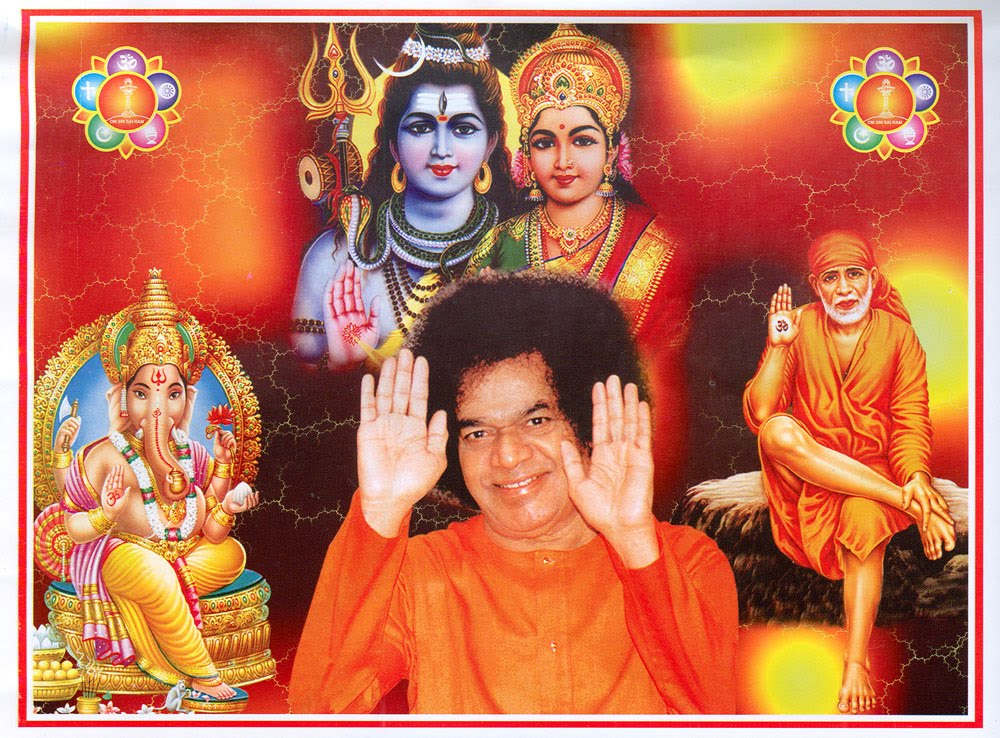|
|
Loving Sai Ram and greetings from Prasanthi Nilayam. I hope I was able to effectively communicate to you what I explained in the last article, which was the first of this series. I realise that I took an entire article to deal with just one question, but then that was the inaugural piece and I took the opportunity to set the stage for the future articles. But this time, I assure you, the pace would be a bit more brisk. In fact, I would be dealing with not one but three questions, all related of course, and in a sense, variations of the same theme.
These are the questions I will attempt to answer this time:
- What is the ultimate path to finish the cycle of birth and death?
- Is Moksha (liberation) a state of being or is it attained only after death?
- If Moksha means no rebirth, will the Universe come to an end only when all creatures attain Moksha, or is Creation eternal?
As you can notice, these questions overlap to a certain extent. However, before I get on to answering the present crop of questions, I hope that those of you who have read the previous article, would be able to see almost immediately the connection between the present set of questions and with what I dealt with then. Essentially, it was all about the pathway to the state referred in the questions this time as Moksha (liberation).
While the first question refers to permanent escape from the recurring cycle of birth and death, the other two speak of Moksha. Let me start with the question of repeated birth and death and to do that, I have to briefly go back to my previous article.
Question 1: What is the ultimate path to finish the cycle of birth and death?
Answer:
If you recall, I had mentioned in it that a human being is actually a body plus atma; actually, if one includes the fine print, a human being is, as Swami often reminds us, a combination of a gross body that is made up of flesh, blood and bones; a subtle mind, which is much more than the brain; and finally the atma. So it is a three-tier structure, layer within layer one might say, with the atma at the core with a sheath called the mind enveloping the atma, and finally the body and the senses as the crust - rather like an onion with its many layers.
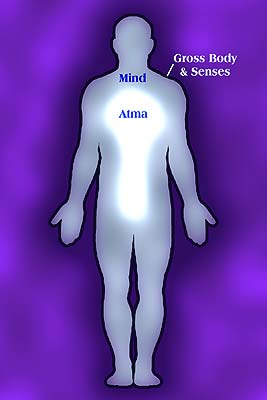 | |
The 3-tier structure of the body: the atmic core, the mind-sheath and the outer crust of the gross body and senses |
By the way, please note that this description of a core plus two layers surrounding it is only an analogy and an image to fix our ideas; I am not offering it to you as a description of the actual structure. No one knows for sure if there is indeed actually such a structure. Please keep that caveat in mind.
Now why did I invoke this picture? For a simple reason, which is to discuss what happens to these three entities after death? We all know that after death occurs, the gross body returns, as they say, to the elements. Where disposal of the dead body is concerned, different procedures are adopted in different places and cultures.
While most simply bury the body, in India it is customary to cremate it. Parsis, on the other hand, leave it directly to Nature, meaning that they leave the body in a place called the Tower of Silence, where vultures do the job. As for sailors, they traditionally drop the body into the sea – at least that is what they used to do in the olden days, when they had to sail for months before touching land; maybe these days they bring the body back to the shore to hand over to relatives.
The point simply is that after death, the gross body is disposed off. The question now is: Whatever happens to the other two components, namely the mind and the atma trapped within? According to Vedanta, these two entities now form a union that is often referred to as the subtle body and at the time of death, the subtle body simply cuts loose from the gross body and floats away. Floats away to where and to do what? Ah, that is where the whole thing becomes interesting!
You may be aware of what Swami says regarding death – that it is the dress of life. What Swami means is that the atma wears the human body as a dress. Just as we change dress every day, the embodied atma or the jivatma as I referred to it in the previous article, also keeps on changing the body. Whenever the atma dons a new body, it is young and fresh, it grows and passes through middle age; finally, it becomes old and weak and drops off. What do we do when a dress of ours becomes old and tattered? We simply discard it and go in for a new one, don’t we? The subtle body does the same sort of thing; it discards the old body and goes in search of a new one. That is to say, it goes in search of a new foetus.
The question now is: does the subtle body jump into the very first opportunity it comes across and take residence there? Not at all! Then, what are the rules governing the selection of a new body, if there are any? By the way, why should not the subtle body simply say, enough is enough and not search for a new body? Can that happen, and if so, how is the game played out then?
Let us try and deal with this new crop of interesting questions. First and foremost, when it starts wandering, the subtle body just does not park itself into the very first foetus it comes across. And this is where the ‘Law of Karma ’ or Reflection, Reaction, Resound, if you will, comes into play in an amazing manner. You see, the subtle body goes in search of a new body because it feels it still has things left to do here in this world.
| ||||
At death, unfulfilled desires keep the subtle body returning to a new gross body in order to fulfill them |
Mostly, the unfinished tasks are in the nature of unfulfilled desires. For example, the subtle body might say, “The last time I led life as a miserable beggar, dreaming all the while of great fortune. OK, I flopped, but maybe I would have better luck this time. So why not look for an opportunity in a rich household?” In short, one of the driving forces for rebirth is unfulfilled desires. From this it should be clear that if one learns to cut down desires sharply, then automatically it brings down the probability for rebirth!
Now, while unfulfilled desires do form one major reason for rebirth, there is another and an even more important reason for it, which is the settlement of karmic debt or accounts. The issue of karma, rebirth, and so on, is a big one, which I may not be able to go into it in detail here. However, it is bound to come up later. I shall deal with it fully then. For the present, let me just say that along with latent desires, settlement of karma also forms one of the important reasons for rebirth. And it is the Law of Karma that generally decides who would be born to whom, when and where. Thus, rebirth is a delicate matching process in which the karma of the one who is to be born gets tied up with the karma of the entire family into which the person is being born.
For example, there might be a person who has led an evil life, caused untold misery to many and hardly paid for his sins during his lifetime. The person dies and when his subtle body floats away, it carries for sure a huge suitcase full of karmic debt. This subtle body looks around for a place to park itself. Destiny steers this subtle body to the womb, of say, the daughter of a rich man, given to evil ways himself. He is destined to suffer, and so also is the person to be born. Destiny now plays a matching game by bringing, unknown to the parties involved, all of them together.
The subtle body enters the foetus growing within the womb of the favourite daughter of the rich man, and she consequently delivers a child, probably mentally challenged. The joy of a birth in the family now turns to gloom. Troubles start coming one by one with the mentally challenged child suffering in its own way, the rich man’s family paying for theirs through such multiple pains, and so on. To be sure, the karmic debt of the father and the mother of the new-born child would also come into the picture; altogether, it is a complex, but wonderfully balanced process, though we might not be aware of all the details. God does not leave loose ends the way we humans do; we might not be aware of all the details, but the Law of Karma has got a detailed operating system, complete in every sense.
Thus, if we look at the process of repeated birth and death, a seemingly endless cycle, a logically subsequent question becomes apparent: “How to get out of it all? Indeed, is there a way out at all?” The beauty is that not only is there a tried and tested formula, but also that Swami has called our attention to it so many times. All I have to do is to recall it.
 |
By constantly chanting our chosen name of the Lord, we can end the cycles of birth and death |
The magic formula we are seeking has been offered over two thousand years ago in a very simple form by Adi Shankara in his famous devotional song entitled Bhaja Govindam. Swami has often recited this particular stanza, in which Shankara says, “O fool, if only you would constantly chant the name of the Lord, you can get out for sure from this endless cycle of births and deaths.”
Hearing this, some might be sceptical and say, “O that one, I have heard it, but I don’t think it would work.” This is a totally wrong and unfortunate misconception. Why I do say so? Because, in the Gita, Lord Krishna Himself says the very same thing and within our lifetime, Swami has reiterated this to us hundreds of times; so, how can the formula be wrong?
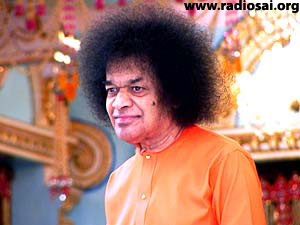 | |
'Always think of Me' |
Let us reflect a bit and examine what exactly is the deal God is offering us. He essentially says, “Bangaru (golden one), I know that in this Kali Age, it is not possible to follow uncomplicated paths to get out of recurring births and unite permanently with Me. So, I tell you what, just do this simple thing. Always think of Me. Anything you do, say that you are doing it for My pleasure. And offer all that you do to Me. Of course, you cannot do anything and everything you like, particularly bad things, and offer them to Me! That is simply not allowed. But if you lead a normal life and do the things I say, I shall take full care of you, and even help you to cut loose from this drudgery of countless births and deaths.”
To some, this may sound too simple and they might suspect that there is some fine print that is being hidden. Let me assure you that where reposing full faith in God is concerned, there is absolutely no fine print; it is as plain as it could be.
Others say, “Listen, how does all this work in practice? Say, there is an airline pilot. What does he do? He cannot be praying all the time.” The beauty is that Swami has answered all such supplementary questions.
Let us go back to the example of the pilot. Before a take off, he would of course, do a mandatory pre-flight check along with his co-pilot. When that check is completed, and the ground staff has deplaned, he would, after getting clearance from the Air Traffic Control tower, get ready to start the engines. At that moment, he could, if he loves God, just close his eyes for a few seconds and say a silent prayer:
“Lord, I am about to take off on this long trans-continental flight. I offer it to You. And after take off, when I would be busy concentrating on my work, I might not be able to think of You all the time, but Lord, be kind and treat all my attention to work as service to You, because by flying carefully I would be serving my passengers. However, since You are in every passenger, I would like You to treat that as service to You. Help me to fly safely.”
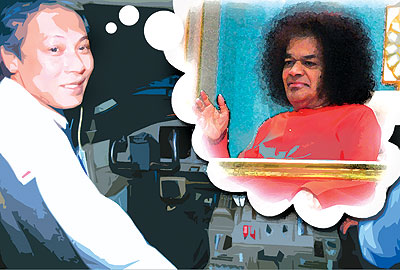 | |
'I offer it to You' |
Once he takes off, the pilot does his job as his profession calls him to do; when he finally lands, he thanks his crew, and just before getting out of the cockpit he says a silent prayer again to the Lord, expressing gratitude for bringing the aircraft and all its passengers safely to the destination. So you see, even modern life can be neatly blended to Shankara’s formula.
A lady once asked, “Swami, I am a mere housewife, and the work I do all the time is mundane. How do I offer all that drudgery to You? It does not seem proper at all.” Swami smiled and replied, “You are wrong. What you call drudgery is a part of your work and duty. Duty is never trivial, and all duty can be offered to God. In fact, God loves those who perform their duty with great sincerity and thoroughness. Thus, while you are sweeping the house, you can think of God and say, ‘Please help me to sweep my heart clean, like I am now doing to the floor.’
When you are cutting vegetables, you can similarly pray to God saying, ‘God, help me to cut down my ego just like I am now cutting vegetables,’ and so on. There are a hundred different ways of remembering God while you are working and offering what you are doing to Him. The important thing is to sanctify time, every second of it. In other words, just because we live in the modern age, it does not mean that the age old formula of Shankara is no longer valid.” And, as if to strongly reiterate that point, Swami Himself often sings Bhaja Govindam at the end of His discourses.
I trust I have said enough by way of responding to the first question. Let me now turn to the second. Just to refresh your memory, it is:
Question 2: Is Moksha a state of being or is it attained only after death?
Answer:
Let me begin my response by reminding you about how Swami defines the word moksha, often translated as liberation. He says, moksha simply means mohakshayam or getting rid of moha, or infatuation for and attachment to the attractions of the world. People are infatuated with and have a craving for all sorts of things ranging from power and position to wealth and property. It is this sense of attachment that binds us to this world, causing one to be born again and again. Thus, moskha is a state of mind that is free from desires. To put it differently, the mind becomes truly free and thus, 'liberated' when it gets rid of desires.
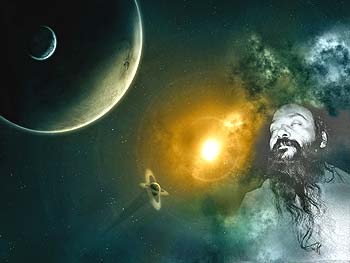 | |
When the clutter of desires are removed from the mind, what remains is Moksha - God |
Stated thus, moksha is something that can be attained even while one is alive; indeed it had better be, for otherwise we cannot easily escape rebirth! Now to the second part of the question, which is an important part I might add. Let us say there is a person who during his or her lifetime has become liberated from desires; what happens after death?
Is it at all meaningful to ask such a question? It sure is, and to stress that point, I would like to draw attention to one of the many stone slabs one would find in the campus of the Brindavan College. This particular slab I have in mind has the saying or rather the equation, by Swami of course,
Man – desires = God
What it implies is if a person has rid himself or herself of desires while alive, then when that person finally sheds the body, he or she becomes united with God, forever. That means two things; firstly, no rebirth, and secondly, one would be in a state of eternal bliss, for God is the same thing as the atma, and bliss is the nature of the atma. I hope this is clear.
Now, to the third question in the trio I have taken up for consideration in this article. This question reads:
Questions 3: If Moksha means no rebirth, will the Universe come to an end only when all creatures attain Moksha, or is Creation eternal?
Answer:
This is an interesting question.The liberation or the attainment of moksha is a process related to an individual, and has to be dealt with on a case-by-case basis. At any given time, the earth has billions of individuals, and each is at some stage or the other towards the attainment of moksha. Moksha does not come easily, and in fact at any given time, there would be millions and millions who are far away from moksha, immersed as they all would be in moha!
Let me now turn to Creation. If by Creation you mean the birth of the Universe, then modern cosmology seems to veer to the view that the Universe not only has a beginning, but also an end. I must hasten to add that the view that the Universe would come to an end is not absolutely certain; there are many scenarios, but all that does not matter.
Even in Vedanta, which admits not only of the birth of the Universe as also to its dissolution, no where does it say that the Universe would end when all humans are liberated. In fact, it might well happen that the human race might become extinct long before the Universe ceases to exist! This certainly is what one might expect on the basis of science, no matter what model of cosmology one believes in.
 |
The evolution of the universe may not necessarily end with the liberation of all of humanity |
This being the case, it is clear that the end of the human race and the end of the Universe are two different things. Incidentally, it took many billions of years after our Universe was created for our solar system to be born, and a billion years after that for the first primitive form of life to appear on earth.
And after that first primitive form of life emerged on earth, hundreds of millions of years had to pass before humans appeared. Thus, compared to the life span of the Universe, the span of human existence is exceedingly small. This is something we need to keep in mind. The chances are the human race would vanish long before the earth and the solar system do so; that also should not be lost sight of.
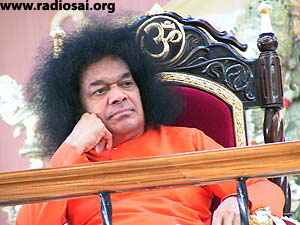 |
So what happens when humans become extinct? Clearly, at the time of extinction, different people would be in different stages of spiritual evolution, and my guess is that when another Universe is created and populated with humans, it might continue from where things were left off earlier, rather like an episode in a TV serial continuing from where it left off the previous week.
I must confess that this part of my reply is entirely speculative, and I myself have not come across anything substantive on this matter. My own personal view is that these types of issues are interesting for engaging in academic discussions, but not very relevant from a purely spiritual point of view. I am sure many listeners would disagree, but I do not mind that; different people, different views!
But this much I am confident of, the world into which we are born is just a stepping stone so to say, for our own evolution. As Swami says in the Gita Vahini, we must while we are alive, do all we can to make sure that we are not born again, and that when we die, it would be the last time! If we get that message and act accordingly, then we are doing fine!
That’s all for now and I do hope that I have done a decent job with my answers. In any case, you are welcome to send in your comments, favourable or otherwise, to h2h@radiosai.org.
Thanks for reading and I look forward to being with you again next month. Jai Sai Ram!



